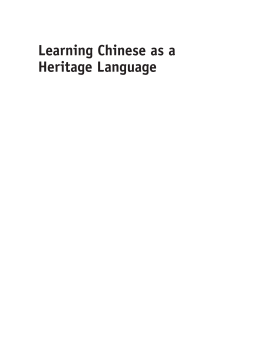
Additional Information
Book Details
Abstract
This book explores the fascinating topic of heritage language learning, looking in particular at Chinese Australians’ learning of Chinese. The author studies the investment, challenges and benefits of heritage language learning across varied contexts including school, work, home and in the community. The book investigates how Chinese Australians navigate and negotiate their Chineseness and how resources are used to support their learning. The book is based on a mixed methods study which uses Bourdieu’s sociological theory, and offers implications for sociologists of language and education, Chinese heritage language learners and teachers, as well as language and cultural policy makers.
This book is an excellent aid in highlighting issues that CHLL undergo as they constantly construct and reconstruct their ethnic identity and language learning processes. It can be beneficial to educators, scholars and language learners and will help CHLL educators of language courses construct better courses.
Nicholas James Figueroa, University at Albany - SUNY, USA
Guanglun Michael Mu is Vice-Chancellor’s Research Fellow at Queensland University of Technology in Australia. His research interests include mixed methods research, diversity and inclusion and Chinese in diaspora. He is also Associate Editor for the International Journal of Disability, Development, and Education.
This book is a compelling account of the habitus of Chineseness in a world of mobility. It offers up a plethora of insights into the implication of heritage language learning in the constitution of Chinese identity; it makes available a sophisticated mixed methods approach for using the thinking tools of Pierre Bourdieu; it adds to these tools a nuanced cultural dimension.
Karen Dooley, Queensland University of Technology, Australia
A thought-provoking, highly engaging work that has deftly shown how Bourdieusian framework can be applied in the research field of literacy education and Heritage Language learning. A must-read for those interested in overseas Chinese communities and Heritage Language learning across various immigrant communities in general!
Liang Du, Beijing Normal University, China
In our increasingly trans-migratory world, language can be central to cultural identity. Dr Mu’s research breaks new ground by adapting Bourdieu’s insights to examine how cultural identity (‘Chinese-ness’) is linguistically learned and practiced in Australia. His remarkable book will interest educators and researchers grappling with how language pertains to identity.
Tom Strong, University of Calgary, Canada
Table of Contents
| Section Title | Page | Action | Price |
|---|---|---|---|
| Contents | v | ||
| Figures and Tables | ix | ||
| Acknowledgements | xi | ||
| Foreword: On Chineseness | xiii | ||
| Preface | xvii | ||
| 1 From the White Australia Policy to Multiculturalism: Chinese Immigrants and Chinese Language in Australia | 1 | ||
| 2 Chinese Heritage Language and its Learners in the West: Empirical Knowledge,Theoretical Framework and Research Method | 24 | ||
| 3 Sociological Mechanism for Learning Chinese as a Heritage Language in Australia: A Quantitative Investigation | 55 | ||
| 4 A Qualitative Exploration of the Profits of Chinese Heritage Language Learning: You Reap What You Sow! | 90 | ||
| 5 Learning Chinese as a Heritage Language: A Perplexed Project | 130 | ||
| Bibliography | 156 | ||
| Index | 169 |
